Just drink milk for strong bones, right? Sometimes it’s not quite that simple.
Calcium is one of the most important minerals in your diet. It’s been clinically proven to improve bone strength, especially when taken in combination with vitamin D.
If you want a better shot at stronger bones, our research team has ranked the best options on the market, plus gone in-depth on the benefits and side effects of calcium supplementation.
Research
Rankings
Last updated: December 21, 2022
Calcium supplements considered: 30
Hours of research: 48
Experts reviewed: 15
Scientific papers referenced: 19
1. Citracal Calcium +D3 Slow Release
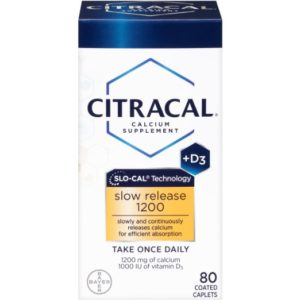
Citracal is a rare bird among supplements: it’s cost-effective, lab-verified, and simple.
Citracal’s slow release formula means you take the dosage once per day. Other calcium supplements need to be divided up into smaller doses throughout the day; otherwise, the calcium passes through your body too quickly and not all of it is absorbed.
The slow release formulation obviates this problem.
The supplement uses a binder called hydroxypropyl methyl cellulose to achieve this slow release effect. Though it’s a long and technical chemical name, it’s a nontoxic plant-derived compound that forms a gel when it comes into contact with water.
This slows the rate at which calcium is released from the tablet into your digestive tract.
Citracal uses a blend of calcium carbonate and calcium citrate to provide the mineral source of calcium, and also provides 1000 IU of vitamin D per capsule alongside 80 mg of magnesium, which makes up 20% of your recommended daily intake.
Its simple, effective formulation makes this supplement a boon for anyone looking for a straightforward, no-nonsense calcium supplement to take daily.
2. Bluebonnet Calcium Citrate and Vitamin D3
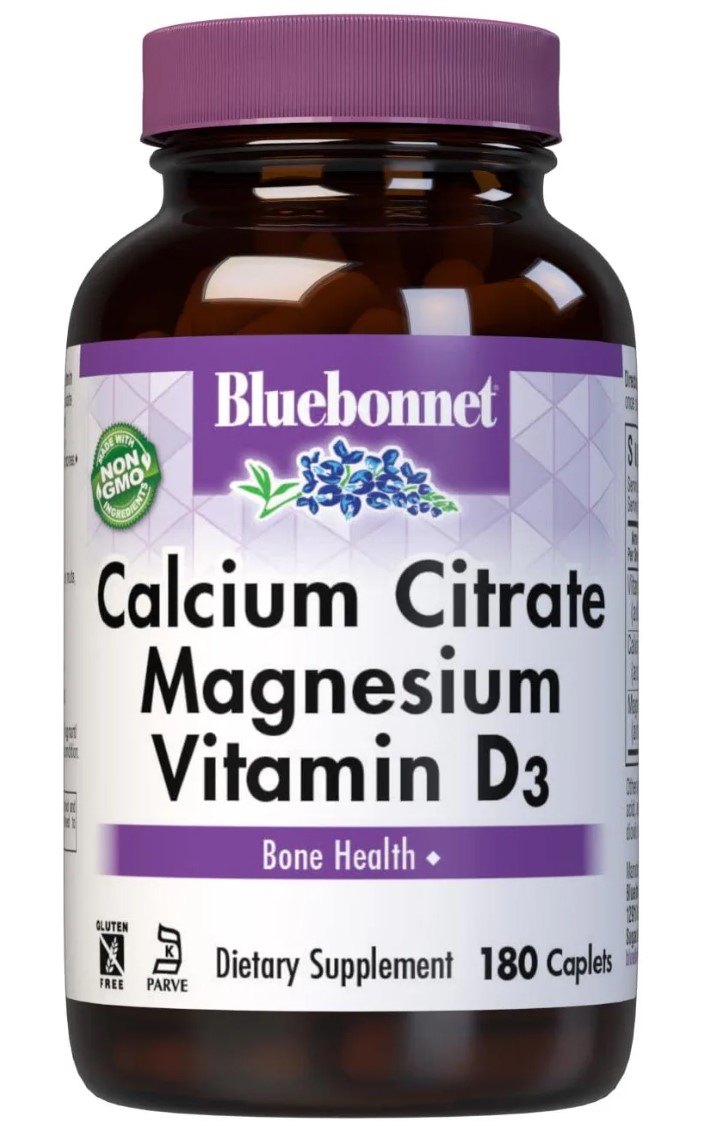
The calcium supplement formulation from Bluebonnet is perfect for the minimalist: it contains very few extraneous ingredients.
In fact, aside from its stated vitamin and mineral content (250 mg of calcium, 200 IU of vitamin D), Bluebonnet Calcium Citrate contains only five other ingredients, and all of them are binders or stabilizers to keep the tablets intact.
Because of the simplicity of the tablet design, it’s an incredibly versatile option.
3. Kirkland Signature Calcium Citrate Magnesium and Zinc
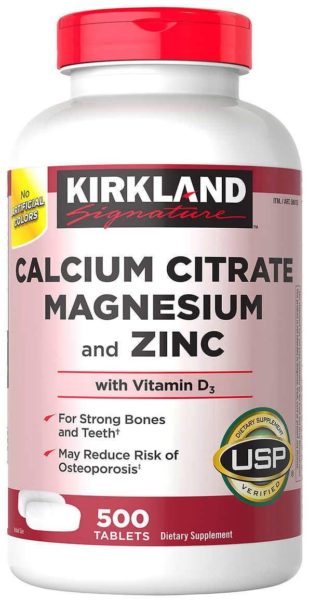
Kirkland’s calcium offering might be the most cost-effective calcium supplement on the market. Its formulation employs calcium citrate to deliver the promised calcium, as well as magnesium oxide and zinc oxide for the other three minerals included in the tablets.
Each tablet provides 250 mg of calcium, 40 mg of magnesium, and 5 mg of zinc. It’s a solid combo that’s great for people who want other trace minerals alongside calcium.
4. GNC Calcium Plus 1000
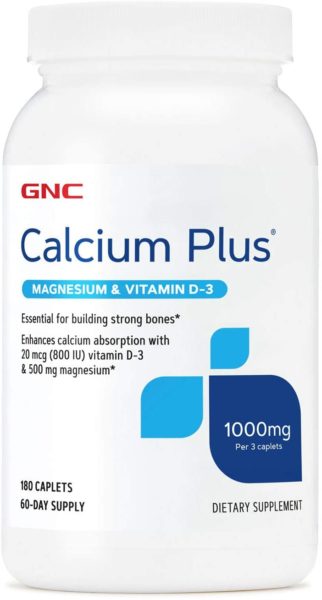
GNC’s calcium supplement is straightforward and no-nonsense: each caplet contains 333 mg of calcium, 266 IU of vitamin D, and 166 mg of magnesium.
GNC Calcium Plus is a good choice if you’re primarily looking for a solid dosage of calcium and vitamin D at a low cost per-dose, without any extra frills like plant-derived calcium, a slow-release formula, or other minerals like zinc.
5. New Chapter Bone Strength Calcium
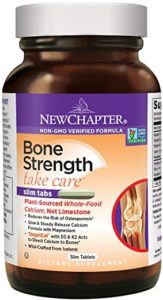
New Chapter Bone Strength is pretty standard, save for its calcium sourcing. The calcium in New Chapter Bone Strength is derived from algae—most supplements use a mineral source, either calcium citrate or calcium carbonate. It’s a nice feature if you want naturally-sourced calcium.
6. Nature Made Calcium with Vitamin D
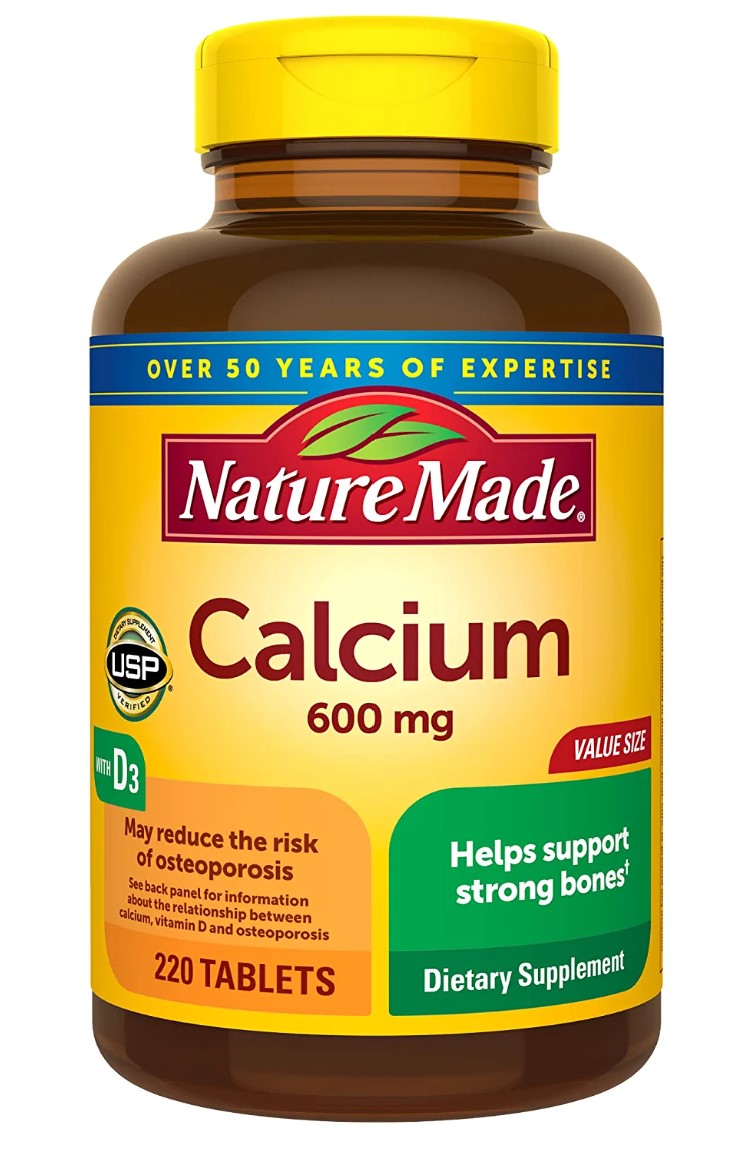
Nature Made Calcium contains 600 mg of calcium and 400 IU of vitamin D, along with several binders and stabilizers in each softgel.
Notably, this supplement also includes some of the same binders used in Citracal’s extended release formulation—it’s likely that this product also has a slow-release effect, which is what allows it to have more calcium per tablet than other supplements.
7. Swanson Calcium Citrate and Vitamin D
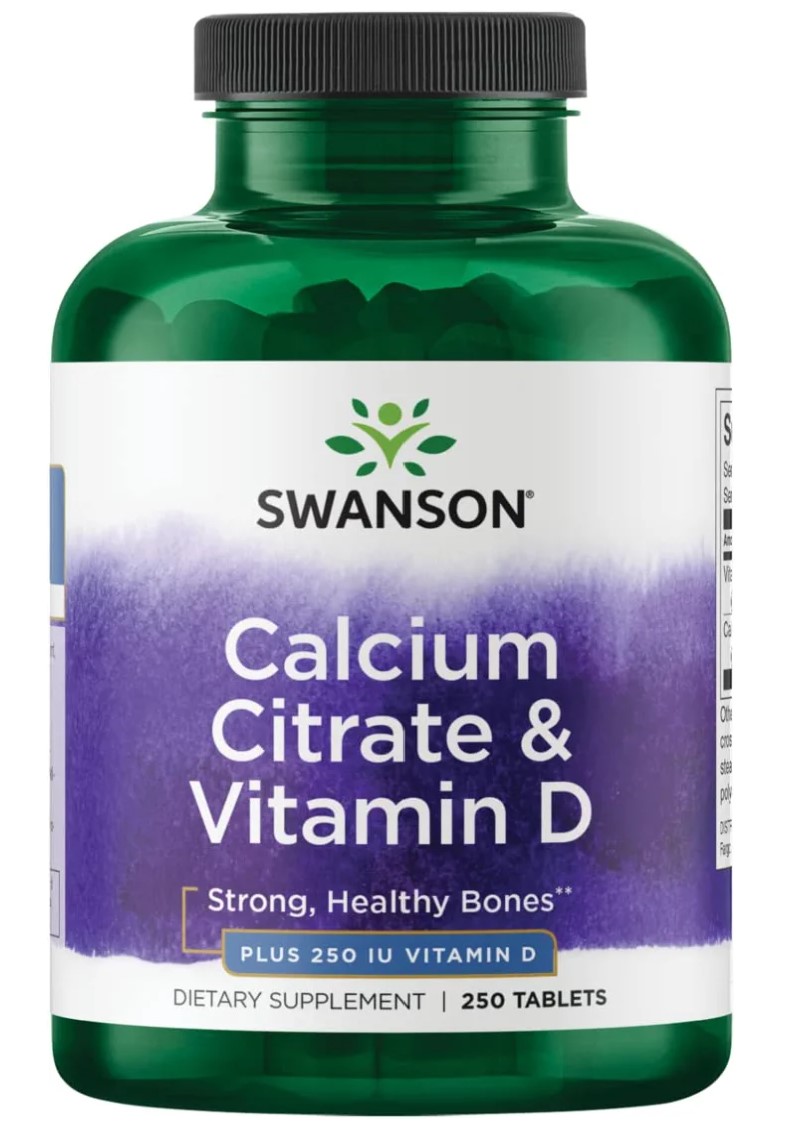
The calcium and vitamin D offering from Swanson Health Products is another one for the simplistic camp. Each tablet contains 310 mg of calcium and 200 IU of vitamin D. The only other ingredients are vegetable-based binders and stabilizers.
If you are looking for zinc or magnesium alongside your calcium and vitamin D, you’re out of luck, but the good news is that Swanson’s calcium supplement sources all of its calcium from calcium citrate, which is a more readily-absorbed form of calcium than calcium carbonate, which is used in some other supplements.
8. Solgar Calcium Magnesium with Vitamin D3
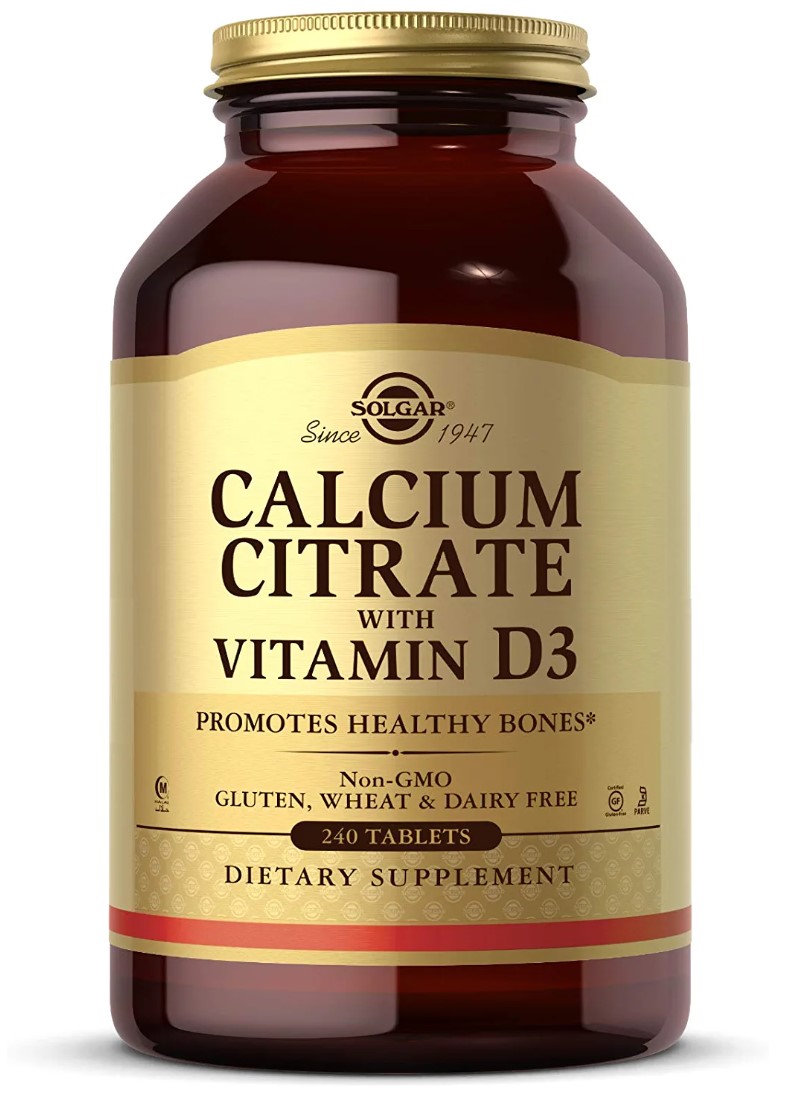
The calcium/magnesium supplement by Solgar is a minimalist-style supplement, even down to the packaging.
A simple amber bottle and brown label identifies the product, which consists of small tablets offering 200 mg of calcium each, alongside 100 mg of magnesium and 80 mg of vitamin D.
You’d need to take five tablets per day (ideally spread out throughout the day) to reach 1000 mg of calcium—the Food and Drug Administration’s recommended daily intake.
9. Rainbow Light Food-Based Calcium
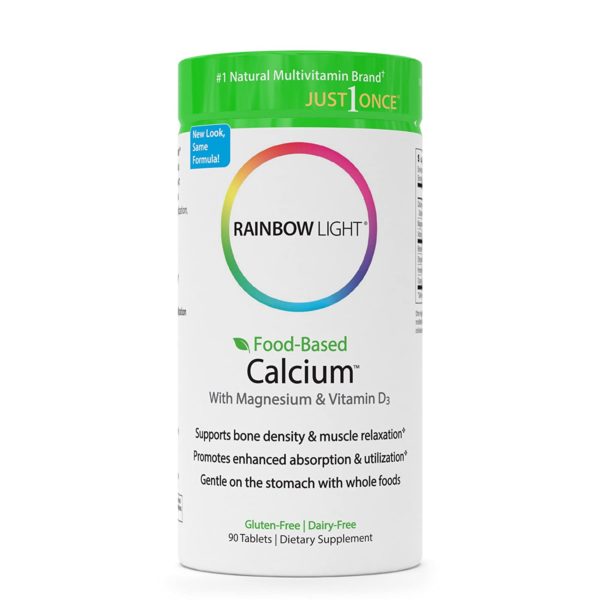
Rainbow Light provides a moderate dosage of calcium in a food-based form, providing calcium alongside magnesium, betaine, spirulina, and a few other herbal ingredients. Unfortunately, it’s a bit heavy on additives, which lands it lower in the rankings.
10. Solaray Calcium Magnesium Zinc
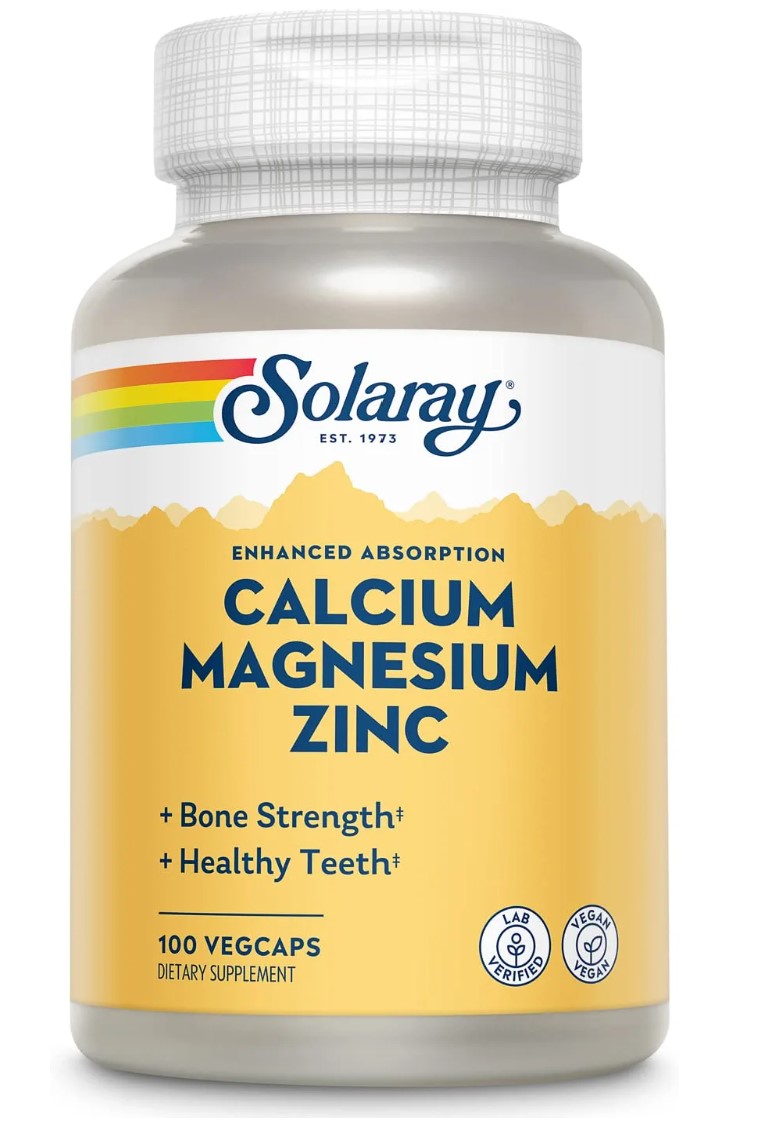
You might term Solaray’s approach to calcium supplementation as the “maximalist” strategy. Each capsule provides a pretty-standard 250 mg of calcium, 125 mg of magnesium, and 6 mg of zinc.
The magnesium is likewise sourced from a variety of ingredients; magnesium oxide, magnesium citrate, and magnesium amino acid chelate round out the magnesium sources.
The zinc is only from one source, an amino acid chelate. It’s a good pick if you care a lot about a variety of mineral sources, but most users will be better-suited by other supplements.
Category winners
Best calcium overall: Citracal Calcium +D3 Slow Release
Citracal wins big-time on two fronts: first, its calcium and vitamin D dose are fantastic. Second, its slow-release formulation means you don’t have to worry about the limits on bioavailability that come along with a standard calcium supplement. Thanks to these advantages, it’s the best overall choice.
Best calcium for bone health: Bluebonnet Calcium Citrate and Vitamin D3
If you want to follow the scientifically-validated template for taking calcium for bone health, Bluebonnet is the way to go. It is a straightforward, no-nonsense calcium supplement with solid amounts of both calcium and vitamin D, to boost absorption. The only downside? You do need to take it several times a day for optimal absorption.
Best calcium for women over 50: Citracal Calcium +D3 Slow Release
Women over 50 need high doses of both calcium and vitamin D, and the slow-release formulation of Citracal is a great way to ensure your intake is high without the trouble of taking four or five different capsules every day.
Best calcium for better sleep: Nature Made Calcium with Vitamin D
When taking calcium for sleep, rapid absorption is key for maximum benefits. The softgel formulation of Nature Made Calcium means the calcium gets absorbed much more quickly than a tablet or traditional capsule.
Best calcium supplement for osteoporosis: Bluebonnet Calcium Citrate and Vitamin D3
For the same reasons Bluebonnet wins out for bone health overall, it also takes the crown for osteoporosis: this supplement follows the template established by high-quality scientific research when it comes to slowing and reversing the loss of bone density associated with osteoporosis.
Best calcium supplement for men: Kirkland Signature Calcium Citrate Magnesium and Zinc
Inadequate calcium intake can be a problem for men, too. Men benefit from Kirkland’s calcium supplement thanks to its inclusion of magnesium and zinc—deficiencies in these minerals are quite common in older men, and are associated with lower testosterone levels (which also contribute to poor bone strength).
Who should buy calcium?
People who will benefit from a calcium supplement can be placed into one of three categories.
Older adults who already know they have low bone density. The first is older adults (particularly women) who already know they have low bone density. For them, supplemental calcium is a scientifically validated way to slow the rate of bone loss and decrease the risk of fracture.
Middle-aged adults who want to stave off loss of bone strength. The next category of people who can benefit from a calcium supplement are middle-aged adults who want to ensure they maintain their already-strong bone density.
For these users, combining calcium supplementation with regular exercise is a good way to maintain strong bones throughout adulthood.
Adolescent girls who want to build bone density more rapidly. Female teenagers can take advantage of the effects of calcium to actually build up substantial amounts of bone density.
Partially due to the hormonal changes that happen during puberty, girls who do not have sufficient calcium intake will not increase their bone density as much during puberty, and the gap between calcium-deficient and calcium-sufficient girls in terms of bone density lasts for the rest of their lives.
How we ranked
Since calcium is one of the most popular supplements on the market, we started with a field of dozens of potential products for our rankings.
Optimal calcium dose. First, we looked for supplements that provided enough calcium for optimal dosing throughout the day. We eliminated anything with less than 200 mg of calcium, and gave strong preference to supplements with 250 mg or more per tablet.
Formulations with key co-nutrients. Calcium uptake is linked strongly to the presence of other micronutrients, most notably vitamin D, magnesium, and vitamin K.
Because of this link, we also required that all of the products that made the final rankings have at least some of these vital nutrients that are required for your body to make the most of the calcium you take. To make the top five, a product had to offer at least 200 IU of vitamin D.
We based this on research that demonstrates that calcium supplementation is more effective when accompanied by at least 800 IUs per day of vitamin D supplementation.
Accurate dosages. Next, we examined which supplements actually contained the label-claimed amounts of calcium and, when available, vitamin D.
We used results from independent laboratory testing to compare how supplements stacked up, and cut the supplements whose actual micronutrient content was vastly different than what was claimed on the label.
Overall supplement composition. Lastly, we looked at the other ingredients in the supplement. Were the capsules vegan-friendly? Did they contain a lot of fillers and binders?
As always, we had a strong preference for a clean, simple ingredient design, and ranked these supplements highly. Our top performer, Citracal, stood out for its innovative slow release design that mitigates the need to take calcium several times per day.
FAQ
Q: How do you take calcium supplements for best absorption?
A: Calcium supplementation can be tricky to get right, because your body’s ability to actually absorb calcium is limited by a number of factors.
First among these is saturation of your body’s calcium absorption capacity. Generally, you don’t want to take one large, single dose of calcium per day, because much of it will pass through your system without getting absorbed.
To solve this, take your calcium three or four separate times during the day. Additionally, make sure your calcium supplement has vitamin D in it as well—this vitamin is essential for proper utilization of calcium in your body.
Finally, to avoid disrupting your iron metabolism, try not to take your calcium supplement at the same time as meals that are high in iron.
Q: What are the best calcium supplements for osteoporosis?
A: For osteoporosis, you want to look for three primary characteristics in a calcium supplement. First, you want the source of calcium to be calcium citrate, not calcium carbonate.
For healthy young and middle aged adults, calcium carbonate is fine, but because stomach acidity decreases as you get older, a calcium citrate based supplement can be easier to digest and absorb.
The other two characteristics to look out for are the calcium content and the vitamin D content: you want a supplement that makes it easy to get at least 1200 mg of calcium per day, and 800 IUs of vitamin D per day. These dosage recommendations come from large, well-designed scientific studies on treating and preventing osteoporosis.
You’ll notice that all of our top ranked calcium supplements, including Citracal, Bluebonnet, and Kirkland Signature, check all of these boxes.
Q: Is calcium citrate better than calcium carbonate?
A: Calcium carbonate is a common form of calcium used in supplements. It has the benefits of being inexpensive, though it relies on stomach acid to make the calcium biologically available.
Calcium citrate can be a better source of calcium because it does not require stomach acid to become bioavailable and does not neutralize the acidity of your stomach. While both the citrate and carbonate forms of calcium are useful, citrate has a slight edge, particularly for older adults.
Q: How can you get calcium without dairy?
A: Vegans, vegetarians, and people with either a milk allergy or lactose intolerance face a much higher risk of calcium deficiency, because dairy is the biggest source of calcium in most people’s’ diets.
There are other foods, like almonds, kale, beans, and broccoli, that are high in calcium as well, but even so, it’s still not a bad idea to take at least a vitamin D supplement, if not a full on calcium and vitamin D supplement for maximum calcium absorption.
Related articles
Recap
In sum, there is strong evidence that taking a calcium and vitamin D supplement can help keep your bones strong and reduce your risk of osteoporosis and bone fractures as you get older. This is important as you approach your fifties, whether you are a man or a woman.
Look for a high-quality calcium supplement, ideally that uses calcium citrate as its mineral source, and definitely check to make sure your supplement includes a substantial amount of vitamin D as well.
If your goal is to prevent bone loss, you’ll get the best results with doses of at least 1200 mg of calcium and at least 800 IU of vitamin D per day.
To ensure you’re keeping your bones as strong as possible, add weight-bearing exercise like walking, jogging, or weight lifting to your daily routine, as calcium supplementation is most effective when combined with an exercise regimen.
For BodyNutrition‘s #1 calcium supplement recommendation, click here.